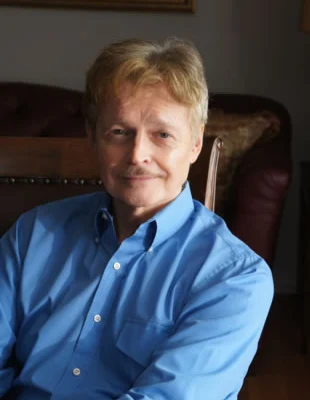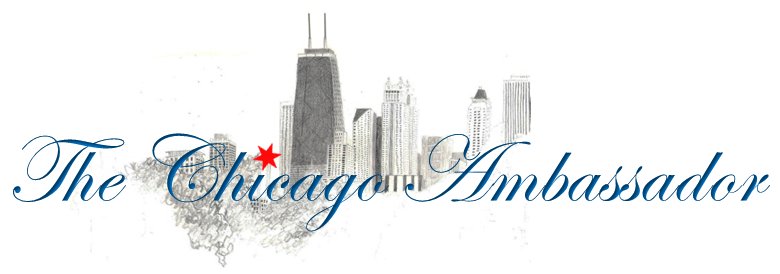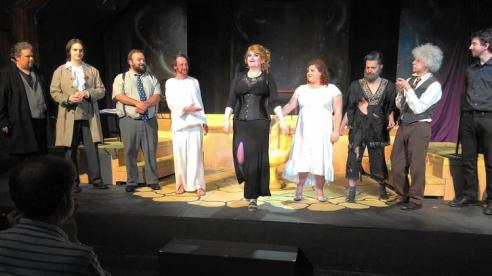Chicago playwright Rick Roberts sure to raise eyebrows and discussion with ‘Thee Trinity’

Rick Roberts
Religion and politics may be off limits for sensible cocktail party conversation, but it makes great fodder for satire. While Thee Trinity, a new play that takes on religion, politics and science opening August 27 at the Royal George Gallery Space is sure to ruffle some feathers, it should also arouse roaring laughter and provoke thought.
Written by Chicagoan Rick Roberts and produced by Polemic Theater Company, Thee Trinity focuses on a imaginary Millennial family reunion of the “Father, Son and Holy Spirit” presiding over humanity’s post-apocalyptic fate, while taking on Islam, Christianity, Judaism and other religions and the intolerance inherent in much of their dogma. The play portrays The Holy Trinity, Archangel Michael and an apparently gay Archangel Gabriel as a dysfunctional family. Human souls — specifically Osama Bin Laden, Albert Einstein, and Oscar Wilde join them, along with the Devil (in female form) to take on questions that make for an often uncomfortable and hilarious conversation.
Thee Trinity is satire, an art form that is often misunderstood. Two recent satires — the musical The Book of Mormon and the film Chiraq both generated controversy — often from critics even before they saw the productions.
In the case of Mormon, it was for its characterization of The Church of Jesus Christ of Latter-day Saints, commonly known as the Mormon religion. Chiraq received most of the critics ire for it’s name, which equated the violence in Chicago to that of Iraq.
On the flip side, Chiraq received many positive reviews from movie and social critics and The Book of Mormon continues it’s run five years after its opening as one of the most successful musicals in American history.
While The Book of Mormon took on a religious topic, it was focused on solely one religion. In Thee Trinity, Roberts mocks what he sees as hypocrisy in several religions and political topics, each getting equally taken to task.
Roberts, a Chicago native, is an American Theater Company “American Dream Award” winner. Outside the theater, he was worked on social issues most of his professional life, working as both a director and board member of a social service agency and a filmmaker developing documentaries focused on the problems of hunger in America, homelessness and other socio-economic issues –including interfaith issues. His former play, The Benchmark, focused on the personal story of his father, who became both homeless and an alcoholic.
The Chicago Ambassador’s Bob Chiarito interviewed Roberts after receiving an advance script of Thee Trinity in the days before the play’s opening.
CA) I read the script of Thee Trinity. It’s really laugh out loud funny. I hope it translates as well when the actors give life to it.
ROBERTS) We have an incredible cast. I’m not just saying this because they are doing this play. If they weren’t good, I’d be really concerned.
CA) You basically touch on every issue that one can think of, especially the current ones in the news. It may be too politically incorrect for some. Do you anticipate any controversy?
ROBERTS) Yes. I think it’s inevitable. It’s not something that we have necessarily courted, but we expect it. Not unlike when The Book of Mormon came out, a lot of people walked out. When we did the staged workshop up in Waukegan, several people walked out. So, we expect that some people won’t get the humor but it’s a satire. Some may think we are dissing the church or religion. I identify as a Christian. I am not dissing the church. I am dissing the way people manipulate religion.
CA) I think that was pretty obvious upon reading it. Whether or not the audience agrees, that’s up to them.
ROBERTS) We think there may be some folks, and not necessarily just Catholics or Protestants, who are upset. I’m talking about Muslims or other faiths that simply don’t like the idea of things being pointed out. I think there’s a potential controversy that we sort of make fun of the fact that Mohammad doesn’t want his face shown. I’m not mocking Islam. I’m mocking the silliness of the expression any body has over a narrow perspective within their religion.
CA) I think you take all the various religions to task. You don’t single out any for any special punishment.
ROBERTS) [Laughs]. Well, thank you. That’s what I tried to do.
CA) You also took a pretty good jab at the Chicago Bears.
ROBERTS) You know, when I first wrote it a couple years ago, I wrote a very rough copy and I put in the Cubs. But now that they are a very strong team, I had to switch it to the Bears, even though I’m a very big Bear fan and I hope I’m wrong.
CA) I think you’ll be ok. [Laughter]. When did you come up with the concept for this play?
ROBERTS) I pay my bills because otherwise playwrights starve, so I have a production company where I do documentaries on social issues. I do a little bit of consulting on those issues as well and one of them is interfaith. I work occasionally for an organization called Sacred Space International and have done several videos for them. It grew out of my experience over the years working with people who I knew who represented different faiths, most of whom are pretty progressive. Plus, I come from a diverse family. I have Catholics and Protestants in my family as well as a Jewish uncle who is sort of a surrogate father to me, so all those things came home to roost.
CA) It’s interesting that while you’ve worked on a lot of social issues, and this play does as well, is this the most comedic thing that you’ve done?
ROBERTS) I used to be very active with an organization called Rotary. One time in my life I was doing therapy with mental patients and I used a tool called psycho-drama, which often utilized humor. It was sort of like improv comedy. So I’ve done that off and on my whole life. This is just the first time that I wrote something that was particularly satirical.
CA) You really touch on everything, Trump, etc. and you don’t beat anything into the ground.
ROBERTS) Thank you. That’s what I tried to do.
CA) The play runs from August 26 through October 1. Any chance that it can be extended?
ROBERTS) Not at that theater, unfortunately. They have another show that starts right after, but if the show becomes very popular and sells out a lot we will look for another location. It will depend on the availability of space and the actors but we would eventually like to also have it staged in other cities as well.
CA) Any reason why you used a double E in Thee in the title?
ROBERTS) Because it’s biblical. You see a lot of it in the bible so I wanted to specify that but even that is a little tongue-in-cheek.
CA) Why did you make the devil female?
ROBERTS) Well, there were two things. That’s a really good question. I wanted to really empower women, even though it’s the devil. If you go back into ancient Judeo-Christian literature, in some of the Jewish texts, there was a woman called Lilith, who might have been an early demonic figure who was involved in the Garden of Eden. There is great debate about this but the idea of empowering a woman to be strong and sophisticated I thought was very important. Also, I grew up in a dysfunctional family and it probably reflects everything in my past, not just women. I had a wonderfully strong mother. I was the only boy in the family. My father ended up homeless when I was a kid and my first play was based on his life, on a homeless man named Mark who lived on a bench. It was called The Benchmark. So I think it’s to empower, to have a strong woman who also makes sense. And not the epitome of evil. I think in the play she’s someone that is really looking for justice.
CA) It was an interesting interpretation, that’s for sure. I liked the way you made Gabriel apparently gay and how you handled the sexual abuse scandals of the Catholic Church. You made it clear that those priests were sent to hell, not because they were gay, but because they took advantage of kids and things like that.
ROBERTS) Yes, that was what I was attempting to focus on, absolutely. I’m not sure if you saw the movie Spotlight, but it was a very powerful film and I have a friend from the Boston area that knew some of those folks. I’m not trying to just pick on the Catholic Church. I’m trying to focus on the sins that all religions like to deny. This is something that the Catholic Church, with its power and wealth, likes to deny.
CA) You had Oscar Wilde who was in Heaven. I thought his character was quite funny. Were there any other people that you considered to be in the play?
ROBERTS) Oh yes, absolutely. I thought about bringing back Stalin and Hitler but decided that they have been done to death, so to speak. I had Einstein because I wanted to have someone who could address the science versus religion issue and also somebody who could reflect on the fact that even he faced bigotry because of Hitler. I thought about Leonardo Di Vinci, who was brought up in the play because he was a brilliant scientist who also did all sorts of things and things that weren’t so good. He did develop the machines of war for the Borgia’s so that they could maintain control of the Papacy through force.
CA) I don’t think one has to be Catholic to be disgusted with the sex abuse scandals. There is enough of that outside the Church as well, look at Penn State.
ROBERTS) Isn’t it amazing? I thought about that too as I was writing. The play is sort of stand-in for a lot of the social issues that we are facing. When I bring Osama Bin Laden back, some people at the readings said they wanted to hear more from him but I didn’t want to give his character a platform for being a murderer.
CA) In a way, you defend true Islam by slamming him in the play.
ROBERTS) Yes. And Muhammad is in Heaven.
CA) You wouldn’t think it would be funny but it is.
ROBERTS) I tried to bring humor into an area that it is difficult to bring it into, but I think people will respond more to the play if they are able to laugh. If you go to a very intense play, it’s rare that it can hold your attention and that you feel good when you leave. You might be exhausted because it’s so intense. I want people to leave having a very positive experience but also thinking about all the things they just heard.
Be sure to “Like” us on Facebook!



Leave a comment